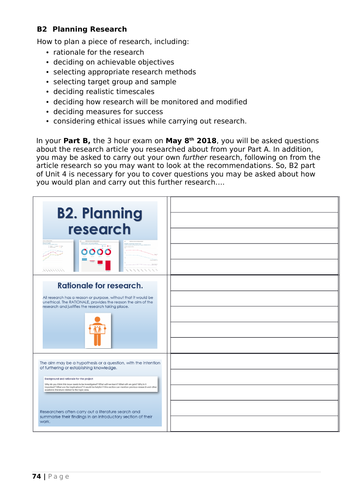







This is a resource package consisting of , a 23 page booklet (Word) you can add and alter, with space for students to add notes, applied activities to complete and references to the BTEC textbook. It is a continuation fromthe Learning Aim A and B1 booklets, also on TES. Along with the booklet, there are Four PowerPoints to give interest to the delivery of the content for B2. Planning a research project and B3. Ethics Issues in research, as below:-
B2 Planning Research
How to plan a piece of research, including:
• rationale for the research
• deciding on achievable objectives
• selecting appropriate research methods
• selecting target group and sample
• deciding realistic timescales
• deciding how research will be monitored and modified
• deciding measures for success
• considering ethical issues while carrying out research.
B3 Ethical issues
Ethical principles in research reporting, including:
• maintaining confidentiality of participants, including of any settings
• ensuring that participants have given their consent
• the need to seek consent from parents or carers if participants are under 18 or lack appropriate mental capacity
• research conduct, including keeping a professional distance
• data protection legislation, policies and procedures, including using the research only for the stated purpose
• human rights legislation, policies and procedures and how this relates to conduct of research (legislation must be current at time of delivery and applicable to England, Wales or Northern Ireland)
• the use and misuse of results, including statistics that inform practice, informed consent from participants and the 1947 Nuremberg Code 10 rules, in relation to ethical research, misuse of results, e.g. Andrew Wakefield and the MMR research
• conflicts of interest in research and how to avoid them, peer reviews including human subjects, mentoring, research misconduct, professional distance, disclosure and whistle-blowing
• role of organisations, e.g. National Social Care Research Ethics Committee.
There's a Facebook group with 5,000 health and social care sharing ideas and resources, come and join the big subject team :-)
#hscresources TES shop for free and small charge resources
Good luck in your teaching :-)
B2 Planning Research
How to plan a piece of research, including:
• rationale for the research
• deciding on achievable objectives
• selecting appropriate research methods
• selecting target group and sample
• deciding realistic timescales
• deciding how research will be monitored and modified
• deciding measures for success
• considering ethical issues while carrying out research.
B3 Ethical issues
Ethical principles in research reporting, including:
• maintaining confidentiality of participants, including of any settings
• ensuring that participants have given their consent
• the need to seek consent from parents or carers if participants are under 18 or lack appropriate mental capacity
• research conduct, including keeping a professional distance
• data protection legislation, policies and procedures, including using the research only for the stated purpose
• human rights legislation, policies and procedures and how this relates to conduct of research (legislation must be current at time of delivery and applicable to England, Wales or Northern Ireland)
• the use and misuse of results, including statistics that inform practice, informed consent from participants and the 1947 Nuremberg Code 10 rules, in relation to ethical research, misuse of results, e.g. Andrew Wakefield and the MMR research
• conflicts of interest in research and how to avoid them, peer reviews including human subjects, mentoring, research misconduct, professional distance, disclosure and whistle-blowing
• role of organisations, e.g. National Social Care Research Ethics Committee.
There's a Facebook group with 5,000 health and social care sharing ideas and resources, come and join the big subject team :-)
#hscresources TES shop for free and small charge resources
Good luck in your teaching :-)
Something went wrong, please try again later.
Clear and easy to follow but do you have the accompanying mark scheme for the exam questions you have used please?
Report this resourceto let us know if it violates our terms and conditions.
Our customer service team will review your report and will be in touch.
£6.00